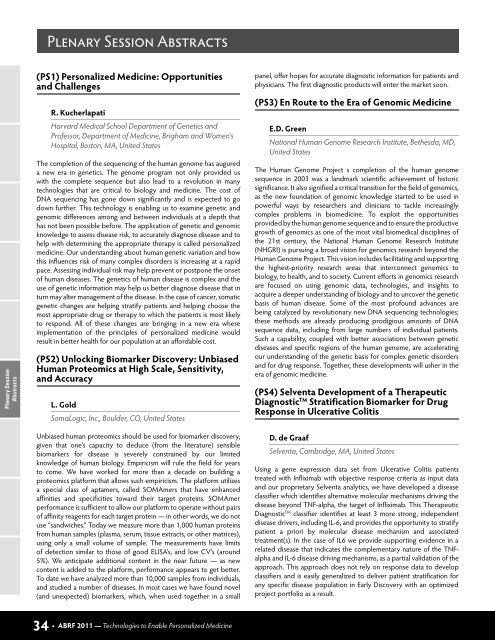Conference Program - ABRF 2011 - Association of Biomolecular ...
Conference Program - ABRF 2011 - Association of Biomolecular ...
Conference Program - ABRF 2011 - Association of Biomolecular ...
- No tags were found...
You also want an ePaper? Increase the reach of your titles
YUMPU automatically turns print PDFs into web optimized ePapers that Google loves.
Plenary Session AbstractsPlenary SessionAbstracts(PS1) Personalized Medicine: Opportunitiesand ChallengesR. KucherlapatiHarvard Medical School Department <strong>of</strong> Genetics andPr<strong>of</strong>essor, Department <strong>of</strong> Medicine, Brigham and Women’sHospital, Boston, MA, United StatesThe completion <strong>of</strong> the sequencing <strong>of</strong> the human genome has augureda new era in genetics. The genome program not only provided uswith the complete sequence but also lead to a revolution in manytechnologies that are critical to biology and medicine. The cost <strong>of</strong>DNA sequencing has gone down significantly and is expected to godown further. This technology is enabling us to examine genetic andgenomic differences among and between individuals at a depth thathas not been possible before. The application <strong>of</strong> genetic and genomicknowledge to assess disease risk, to accurately diagnose disease and tohelp with determining the appropriate therapy is called personalizedmedicine. Our understanding about human genetic variation and howthis influences risk <strong>of</strong> many complex disorders is increasing at a rapidpace. Assessing individual risk may help prevent or postpone the onset<strong>of</strong> human diseases. The genetics <strong>of</strong> human disease is complex and theuse <strong>of</strong> genetic information may help us better diagnose disease that inturn may alter management <strong>of</strong> the disease. In the case <strong>of</strong> cancer, somaticgenetic changes are helping stratify patients and helping choose themost appropriate drug or therapy to which the patients is most likelyto respond. All <strong>of</strong> these changes are bringing in a new era whereimplementation <strong>of</strong> the principles <strong>of</strong> personalized medicine wouldresult in better health for our population at an affordable cost.(PS2) Unlocking Biomarker Discovery: UnbiasedHuman Proteomics at High Scale, Sensitivity,and AccuracyL. GoldSomaLogic, Inc., Boulder, CO, United StatesUnbiased human proteomics should be used for biomarker discovery,given that one’s capacity to deduce (from the literature) sensiblebiomarkers for disease is severely constrained by our limitedknowledge <strong>of</strong> human biology. Empiricism will rule the field for yearsto come. We have worked for more than a decade on building aproteomics platform that allows such empiricism. The platform utilizesa special class <strong>of</strong> aptamers, called SOMAmers that have enhancedaffinities and specificities toward their target proteins. SOMAmerperformance is sufficient to allow our platform to operate without pairs<strong>of</strong> affinity reagents for each target protein — in other words, we do notuse “sandwiches.” Today we measure more than 1,000 human proteinsfrom human samples (plasma, serum, tissue extracts, or other matrices),using only a small volume <strong>of</strong> sample. The measurements have limits<strong>of</strong> detection similar to those <strong>of</strong> good ELISA’s, and low CV’s (around5%). We anticipate additional content in the near future — as newcontent is added to the platform, performance appears to get better.To date we have analyzed more than 10,000 samples from individuals,and studied a number <strong>of</strong> diseases. In most cases we have found novel(and unexpected) biomarkers, which, when used together in a smallpanel, <strong>of</strong>fer hopes for accurate diagnostic information for patients andphysicians. The first diagnostic products will enter the market soon.(PS3) En Route to the Era <strong>of</strong> Genomic MedicineE.D. GreenNational Human Genome Research Institute, Bethesda, MD,United StatesThe Human Genome Project s completion <strong>of</strong> the human genomesequence in 2003 was a landmark scientific achievement <strong>of</strong> historicsignificance. It also signified a critical transition for the field <strong>of</strong> genomics,as the new foundation <strong>of</strong> genomic knowledge started to be used inpowerful ways by researchers and clinicians to tackle increasinglycomplex problems in biomedicine. To exploit the opportunitiesprovided by the human genome sequence and to ensure the productivegrowth <strong>of</strong> genomics as one <strong>of</strong> the most vital biomedical disciplines <strong>of</strong>the 21st century, the National Human Genome Research Institute(NHGRI) is pursuing a broad vision for genomics research beyond theHuman Genome Project. This vision includes facilitating and supportingthe highest-priority research areas that interconnect genomics tobiology, to health, and to society. Current efforts in genomics researchare focused on using genomic data, technologies, and insights toacquire a deeper understanding <strong>of</strong> biology and to uncover the geneticbasis <strong>of</strong> human disease. Some <strong>of</strong> the most pr<strong>of</strong>ound advances arebeing catalyzed by revolutionary new DNA sequencing technologies;these methods are already producing prodigious amounts <strong>of</strong> DNAsequence data, including from large numbers <strong>of</strong> individual patients.Such a capability, coupled with better associations between geneticdiseases and specific regions <strong>of</strong> the human genome, are acceleratingour understanding <strong>of</strong> the genetic basis for complex genetic disordersand for drug response. Together, these developments will usher in theera <strong>of</strong> genomic medicine.(PS4) Selventa Development <strong>of</strong> a TherapeuticDiagnostic TM Stratification Biomarker for DrugResponse in Ulcerative ColitisD. de GraafSelventa, Cambridge, MA, United StatesUsing a gene expression data set from Ulcerative Colitis patientstreated with Infliximab with objective response criteria as input dataand our proprietary Selventa analytics, we have developed a diseaseclassifier which identifies alternative molecular mechanisms driving thedisease beyond TNF-alpha, the target <strong>of</strong> Infliximab. This TherapeuticDiagnostic TM classifier identifies at least 3 more strong, independentdisease drivers, including IL-6, and provides the opportunity to stratifypatient a priori by molecular disease mechanism and associatedtreatment(s). In the case <strong>of</strong> IL6 we provide supporting evidence in arelated disease that indicates the complementary nature <strong>of</strong> the TNFalphaand IL-6 disease driving mechanisms, as a partial validation <strong>of</strong> theapproach. This approach does not rely on response data to developclassifiers and is easily generalized to deliver patient stratification forany specific disease population in Early Discovery with an optimizedproject portfolio as a result.34 • <strong>ABRF</strong> <strong>2011</strong> — Technologies to Enable Personalized Medicine


